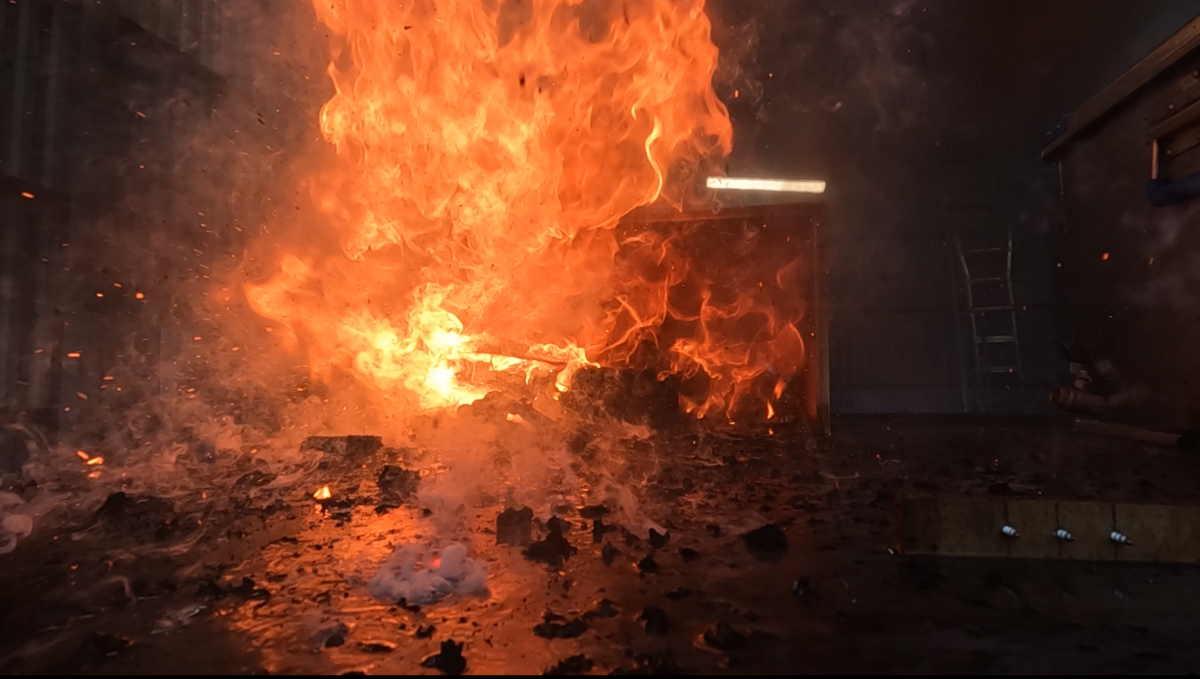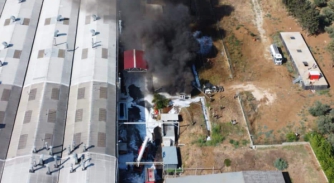Fighting fire with fire competence
Eirik Eidem, CEO of training course provider OComp, on the importance of enhancing lithium-ion battery safety on superyachts…

Thermal runway in a lithium-ion battery
With the growing prevalence of lithium-ion batteries on superyachts, the maritime industry is encountering new and significant risks. These powerful batteries, integral to electric watercraft and various on-board systems, pose unique challenges, particularly in terms of fire safety. Despite these risks, many crew members report a lack of formal training on how to handle lithium-ion batteries. As incidents involving these batteries increase, it’s becoming clear that there is a gap in competence that needs addressing.
At OComp, we have trained more than 3,000 maritime professionals working on vessels equipped with lithium-ion batteries. Through feedback from participants and dialogue with unions, we consistently hear a common concern: crews feel unprepared to deal with the new safety challenges that lithium-ion technology presents.
Why lithium-ion battery training is crucial
Lithium-ion battery fires are not just a theoretical risk. Real-world incidents, such as the fire aboard M/Y Kanga in 2018, have shown how rapidly things can escalate when these batteries malfunction. The risk comes from a phenomenon called thermal runaway, where a battery’s temperature spikes uncontrollably, leading to fire, explosions and the release of toxic gases.
Without proper knowledge and the ability to act quickly, crews face the threat of severe consequences, including significant damage to the vessel and harm to those on board.
Recent incidents highlight the urgency
One of the most significant examples of a lithium-ion battery incident in recent years is the deadly fire aboard a 70-foot Viking yacht, which occurred on 26 July, 2023, at a marina in the Florida Keys. The fire is believed to have been caused by a lithium-ion battery from an e-bike that had fallen into the water earlier in the day. After retrieving the bike, the battery was placed inside the yacht on a wooden cabinet that also contained USCG-required safety flares. The fire, which quickly spread due to the battery and flares, resulted in a tragic death and two critically injured.
In the case of the superyacht M/Y Kanga, the crew was unaware of how dangerous lithium-ion batteries could be. The investigation into the fire concluded that it was probably caused by the lithium batteries of an electric surfboard. The fire took less than 25 minutes to spread, followed by several explosions, causing severe damage to the yacht.

The result of piercing a ithium-ion battery
Another incident on the Tansu motoryacht Siempre further emphasises the risks. In September 2021, a fire led to the total loss of the yacht while moored at the port of Olbia in Italy. The Malta Marine Safety Investigation Unit’s report cited the possibility of lithium-ion batteries being the cause or at least contributing to the fire’s rapid escalation. Crew members were forced to jump into the water as the fire spread uncontrollably. The incident shows how critical it is to handle lithium-ion batteries carefully and dispose of them properly.
Competence as a preventive measure
The most effective way to reduce both the occurrence and the consequences of lithium-ion battery fires is through proactive, comprehensive training. As crew members develop a deeper understanding of battery systems, they are better equipped to prevent malfunctions and respond quickly to potential failures.
Even though there are regulations in place, such as the ISM Code and the STCW Convention, which mandate training and familiarisation in safety and operational procedures, there remains a significant gap in the industry when it comes to lithium-ion battery safety training.
For instance, ISM Code 6.3 requires yacht managers to establish procedures ensuring that personnel are familiar with their duties, particularly those in safety roles. Training should directly address this by offering thorough lithium-ion battery safety training, ensuring compliance with these ISM Code obligations.
Similarly, ISM Code 6.5 stresses the need for identifying and providing necessary training to support safety management systems. Equipping crew with essential knowledge is vital for safe superyacht operations.
Moreover, STCW Convention Regulation I/14 – 5 highlights the need for companies to familiarise seafarers with their duties and relevant safety procedures. Training courses should not only cover theoretical knowledge but also offer practical skills necessary for handling lithium-ion battery-related incidents, ensuring yacht managers meet their obligations under the STCW Convention.
Proper training enables crew members to:
• Identify early signs of battery failure, such as overheating or physical damage.
• Respond swiftly and appropriately to incidents, handling toxic gas emissions and executing evacuation plans.
• Foster a culture of safety and preparedness on board, ensuring everyone shares responsibility.
Conclusion: A call to action
As lithium-ion battery technology becomes more widespread, the need for specialised training grows. The maritime industry must address the current training gap to ensure that all crew members, from officers to deckhands, are equipped with the knowledge and skills to manage the risks posed by these powerful batteries. One of our course participants summed up the urgency of the situation: “This is knowledge that absolutely should be taught to everyone on board.”
By investing in competence now, the superyacht industry can prevent potentially catastrophic incidents, safeguard the lives of crew and passengers, and protect the significant financial investments that superyachts represent. Training is not just about compliance; it is about ensuring that all crew members are prepared to handle the evolving risks of modern maritime operations.
Images © OComp AS
Any views, thoughts and opinions expressed here are those of the author and are not intended to malign any particular individual or organisation, and may not reflect the views, opinions, policies or positions of The Superyacht Group.
As an open-source platform we offer an industry-wide invitation to anyone and everyone in our sector to share their knowledge, experience and opinions. So you are invited to share your views and perspectives on the Refit market for our next issue. If you have an interesting and valuable contribution to make, and would like to join our growing community of guest columnists, share your ideas with us at newsdesk@thesuperyachtgroup.com.
NEW: Sign up for SuperyachtNewsweek!
Get the latest weekly news, in-depth reports, intelligence, and strategic insights, delivered directly from The Superyacht Group's editors and market analysts.
Stay at the forefront of the superyacht industry with SuperyachtNewsweek
Click here to become part of The Superyacht Group community, and join us in our mission to make this industry accessible to all, and prosperous for the long-term. We are offering access to the superyacht industry’s most comprehensive and longstanding archive of business-critical information, as well as a comprehensive, real-time superyacht fleet database, for just £10 per month, because we are One Industry with One Mission. Sign up here.
Related news

Fire erupts at Sirena Yachts shipyard
Yet another blaze has been reported at a superyacht shipyard, this time in Bursa, Türkiye
Crew

Several yachts destroyed in Greek marina fire
One firefighter has been hospitalised following a blaze that sank three vessels and damaged more in Marina Zeas
Fleet

VIRSEC launches battery fire awareness course
As lithium-ion batteries become prevalent, mitigating risks through informed crew training, like the VIRSEC ABS-approved course, is crucial
Crew

Fire ravages Croatian marina
Over 20 boats have been destroyed in a blaze that ravaged a Croatian marina in the early hours of Wednesday morning
Fleet

Are lithium-ion batteries on yachts safe?
Pantaenius UK shares insights from an expert marine industry panel
Crew
Related news
Fire erupts at Sirena Yachts shipyard
2 years ago
Several yachts destroyed in Greek marina fire
2 years ago
VIRSEC launches battery fire awareness course
2 years ago
Fire ravages Croatian marina
2 years ago
Are lithium-ion batteries on yachts safe?
3 years ago
NEW: Sign up for
SuperyachtNewsweek!
Get the latest weekly news, in-depth reports, intelligence, and strategic insights, delivered directly from The Superyacht Group's editors and market analysts.
Stay at the forefront of the superyacht industry with SuperyachtNewsweek



